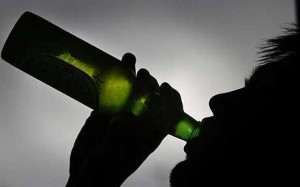Booze, Binging and the Devil You Don’t Know
Imagine this scenario. You are meeting your boyfriend at a restaurant, intending to break up with him. You know this conversation is going to be tough, but you really don’t know what his reaction will be. He could end up sobbing, or shouting, or he could just sit there in uncomfortable silence. You arrive early and order a whiskey—a double—to steady your nerves.
Will the whiskey have its desired effect? Drinkers clearly expect that alcohol will dampen the effects of stress—they often drink for precisely that reason—but in fact this dynamic is poorly understood. We don’t know when or how or for whom a stiff drink will dampen the stress response, even though such an understanding could throw light on problem drinking and its treatment.
The anecdote above is not mine. It comes from psychological scientist Daniel Bradford and his colleagues at the University of Wisconsin, who use it to exemplify uncertainty in stressful encounters. These scientists had the idea that people may use alcohol to dampen the stress of not knowing what’s to come, and indeed that alcohol is more effective as a tension reliever in situations of uncertainty. Here’s how they explored this possibility in the laboratory.
 They started by getting college students a bit drunk. They recruited both men and women, who had had at least one experience drinking excessively—but with no history of alcohol problems. The volunteers abstained from alcohol for 24 hours, and had nothing to eat for four hours prior to the experiment. The students then drank varying amounts of 100-proof vodka mixed with juice, enough to reach blood alcohol concentrations ranging from .01 percent to .12 percent. The highest BAC is the equivalent of six drinks over an hour for an average man—in other words, drunk. For reference, a BAC of .08 is considered legally intoxicated for the purpose of driving a car in most jurisdictions. Other volunteers, the controls, drank fake drinks without any alcohol.
They started by getting college students a bit drunk. They recruited both men and women, who had had at least one experience drinking excessively—but with no history of alcohol problems. The volunteers abstained from alcohol for 24 hours, and had nothing to eat for four hours prior to the experiment. The students then drank varying amounts of 100-proof vodka mixed with juice, enough to reach blood alcohol concentrations ranging from .01 percent to .12 percent. The highest BAC is the equivalent of six drinks over an hour for an average man—in other words, drunk. For reference, a BAC of .08 is considered legally intoxicated for the purpose of driving a car in most jurisdictions. Other volunteers, the controls, drank fake drinks without any alcohol.
They waited a while so the volunteers could reach various states of intoxication, from sober to drunk. Then the scientists measured their stress responses to the threat of an electrical shock. Some knew that they would receive a mild shock, while others knew they would get a pretty bad shock. Still others were uncertain about what would happen to them; they might get a mild shock or a real zap or nothing at all. The scientists expected that the more intoxicated volunteers would experience a greater stress reduction overall—and that this effect would be noticeably greater in situations where they were kept guessing. This was a laboratory equivalent of not knowing how your boyfriend will react to being dumped.
They found that the amount of vodka the volunteers consumed was clearly and directly related to their levels of stress relief. That is, those who drank a lot experienced the greatest dampening of the normal stress response, and this dampening was especially apparent when the volunteers faced a situation of uncertainty. This finding was bolstered by the students’ reports about their own anxiety. So there may be some truth to the old saw, “Better the devil you know than the devil you don’t.”
These findings, reported in a forthcoming issue of the journal Psychological Science, have some real world implications. For example, the direct relationship between alcohol dose and stress response suggests that drinking for relief is reinforced by the very first drink, which may lead to more drinking. What’s more, this reinforcing effect appears to increase with each drink, so that the heaviest drinking brings the most relief from stress. This could help explain the appeal of binge drinking: Episodes of very heavy drinking may be extremely reinforcing, despite all the long-term negative consequences. Indeed, when the scientists sorted out the self-described binge drinkers among the volunteers, it turns out they got much less relief from the stress of uncertainty, compared to non-binge drinkers. These young drinkers may need particularly heavy—and hazardous—amounts of booze to get the rewarding side effects.
Follow Wray Herbert on Twitter at @wrayherbert.




APS regularly opens certain online articles for discussion on our website. Effective February 2021, you must be a logged-in APS member to post comments. By posting a comment, you agree to our Community Guidelines and the display of your profile information, including your name and affiliation. Any opinions, findings, conclusions, or recommendations present in article comments are those of the writers and do not necessarily reflect the views of APS or the article’s author. For more information, please see our Community Guidelines.
Please login with your APS account to comment.